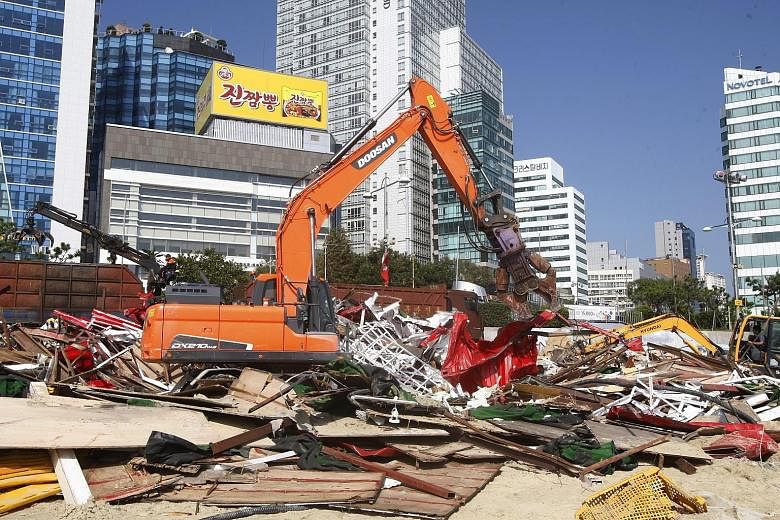SEOUL • Clean-up efforts are under way in South Korea after Typhoon Chaba lashed its southern coast with powerful winds and heavy rains that triggered flash floods and left at least seven people dead and three missing.
The violent storm, with gusts of up to 56.5m per second, passed over the southern tip of the Korean peninsula on Wednesday, pummelling the port of Busan - the country's second-largest city - and the industrial city of Ulsan.
Thousands were deployed yesterday in the southern regions devastated by the powerful typhoon. The military sent troops for restoration work, while help also came from local relief organisations, public workers and police in the hardest-hit cities, such as Ulsan, where 4,000 people gathered to help out.
More than 230,000 homes across the coastal areas suffered power outages, but Korea Electric Power Corp said power had been restored by yesterday morning.
Finance Minister Yoo Il Ho pledged financial aid to support the typhoon victims. Prime Minister Hwang Kyo Ahn, ruling Saenuri Party leader Lee Jung Hyun and several other politicians visited Ulsan yesterday, touring the disaster areas.
A man drowned near his apartment and a woman was found dead in a flooded underground parking lot in the city, which is home to Hyundai Motor's main production facilities. Two car plants had to be closed when the typhoon hit, and one remained shut yesterday due to flood damage.
Said a Hyundai spokesman: "We are trying our best to resume operations as soon as possible, but we need more time to ensure safety in the assembly lines." Photos released by the Hyundai labour union showed flooded assembly lines.
Video from surveillance cameras showed cars, refrigerators and other debris floating down flooded streets, and people struggling through muddy, chest-deep water.
Other footage posted on social media showed waves shattering the glass windows of seafront stores and a wooden house having its roof sheared off after slipping into a swollen river and being carried away under a low bridge.
The storm also disrupted preparations for Asia's largest movie showcase, the Busan International Film Festival, which was scheduled to open yesterday evening.
Festival events planned on Busan's main Haeundae beach had to be cancelled or moved indoors after strong winds blew away or damaged the temporary venues built on the sand.
The typhoon had triggered severe storm warnings in Japan, but was downgraded to a tropical cyclone over the Sea of Japan, which South Korea calls the East Sea, before it hit Honshu island on Wednesday evening.
AGENCE FRANCE-PRESSE, THE KOREA HERALD/ASIA NEWS NETWORK

